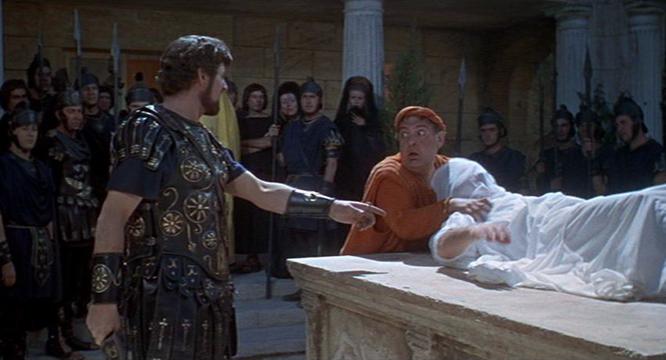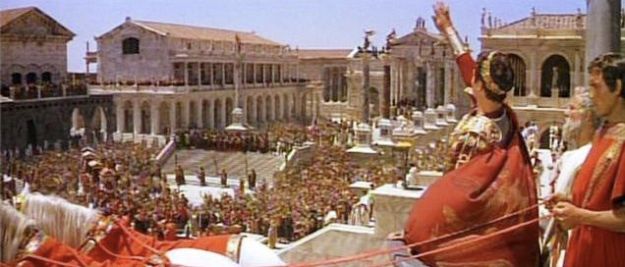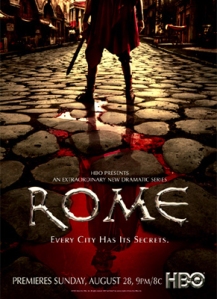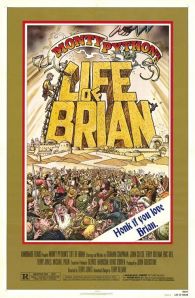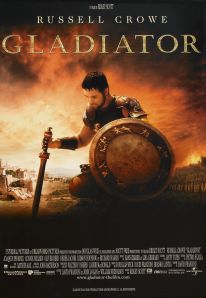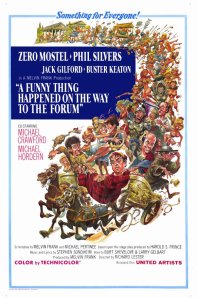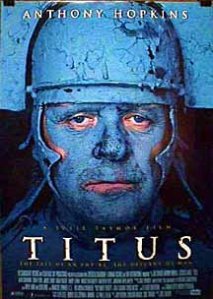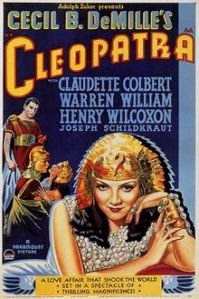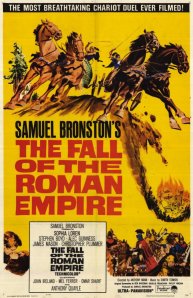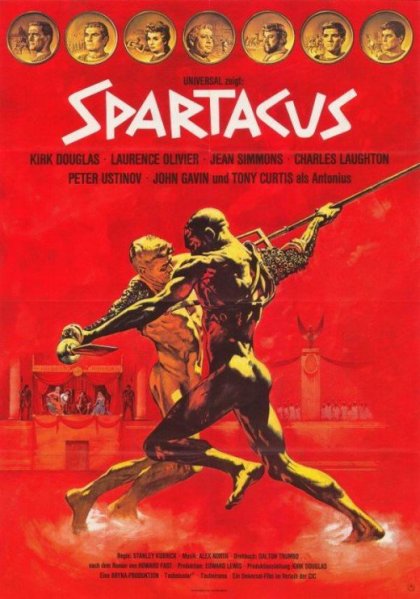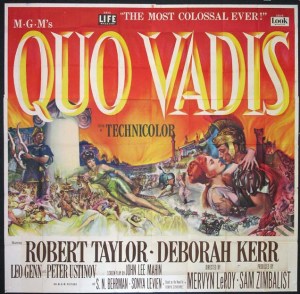“Welcome to Classics 329: The Ancient World in Cinema”
Course Goals & objectives.
This course examines cinematic and television representations of the ancient Greek and Roman Mediterranean, viewed through a variety of literary and cinematic genres in European and American cinema of the 20th and 21st Centuries. These films offer an opportunity to reflect on how our many modern visions of the ancient world cast light on our present as much as they represent the past. Students will read selections from Greek and Roman literary texts (in translation) in conjunction with weekly viewings; secondary readings will be drawn from ancient and contemporary criticism and theory. As active viewers and readers of multiple media, students will learn to react to the ways that films and written narratives are constructed, attending to editing and the composition of scenes, and to how a director uses the process of adaptation and the opportunities of film as a medium to create a multi-sensory reception of a written text. Satisfies the Literary Studies Analysis (FSLT) requirement. Women, Gender, and Sexuality studies Historical Perspectives credit (WGHP).
Textbooks, Films, and Supplies
Monica Silveira Cyrino. 2005. Big Screen Rome. Blackwell Publishing.
Online texts: many readings (will be available two weeks before they are due via this course’s Blackboard site or are on e-reserve).
Course Blog: Urancientworldincinema.wordpress.com
Summary of Grading:
:::::::::::::::::::::(based on 1,000 + points total; subject to modification):::::::::::::::::::
Attendance: 75 points
Class Participation + Viewing Response Questions: 125 points
Lead Discussion: 100 points
2 substantial Blog Posts: 300 points
Blog Comments: 100 points or more
Project Proposal (outline, thesis, annotated bibliography): 100 points
Final Interpretive Research Paper: 200 points
Film Analysis Interpretive Research Paper (9-12 pgs); Proposal; Rough Draft; Final Draft
This final interpretive research paper will be a scaffolded assignment, where each stage helps develop your final paper into a polished piece of writing and a honed argument that engages other critics, primary, and secondary sources.
Substantial Blog Entries (2). Blog as Criticism.
In place of traditional short essays, students in this course will compose two major blog entries (600 words or more, limit 1,000 words). These blog entries might explore in greater depth a theme or topic we’ve raised as a community during our discussions, or might be a response that occurs to a student after a unit or after a particular reading that we did not voice as a group. These blog entries will be substantive in that students will incorporate and properly credit the written work of other critics, and will incorporate illustrative media as well (e.g. photographs, film stills, film clips, links to other online media), alongside their own insights. Like a traditional essay, these blog critiques will persuasively advance a claim or interpretation logically supported with evidence and structured argumentation.
Blog Commenting:
Throughout the semester, I will offer up discussion questions to frame our screenings and to frame or to reinforce our classroom discussions on the blog. Students will be required to comment at least every other week. Be careful, precise, and constructive—no flaming or trolling. These discussion points are to encourage students to engage in dialogues about the readings, or about the themes, critiques, and problems raised by the readings.
Course Blog:
The course blog is: https://urancientworldincinema.wordpress.com. Everyone will have to sign up for WordPress: http://wordpress.com/ by the second week. I will collect the emails you signed up under during class session to add you as authors to the blog. To write a blog post, sign in at: http://dashboard.wordpress.com.
Extra credit: relevant additional blog posts (400 + words, two max.) can receive up to
First Blog Online– No Later than Friday Sept 24, 5 pm
Second Blog Online– No Later than Friday Oct 29, 5 pm
Thesis Statement, outline, and beginning bibliography – due by 5 pm Friday, Nov 12
(via email or in paper copy)
First Draft of Project Due – Tuesday, Nov 23 by 5 pm (By email, and in paper copy to my office)
Final Draft of Project Due – Friday, Dec 10th (in paper copy to my office)
Policies.
- This syllabus (especially the schedule) is subject to change with notice.
- Check Blackboard and the blog before class for readings, updates, images, links, etc.
- To succeed in this course, you must read the readings and watch the films actively, take notes, and create discussion questions for 2–3 hours on your own for every hour spent in class—this means 2–3 hours between each class, at least 6–9 hours per week total.
- Success in this course depends upon regular attendance. You are responsible for learning the material covered in class discussions, including any you may miss. You should be forewarned that the bulk of what we cover cannot be found in any textbook, so attendance and accurate note-taking are especially important. I allow two absences, with no questions asked. After the third absence, your final grade will suffer substantially. In the case of excessive absences (5 or more, or over two weeks of our course) this will mean that you will automatically fail the course.
- Our classroom and blog are safe and brave spaces. Please be respectful of differences of opinion, be mindful to take responsibility for your own statements, and to distinguish between a comment and the speaker who voices it. Films and criticism about the ancient world raise many controversial issues, and we will work together to create an open-minded, diverse community of speakers and opinions. No forms of hate-speech will be tolerated.
Disability statement: If you have a documented disability, I’d like to discuss academic accommodations with you. Please contact me as soon as possible.
Honor Code:
This course recognizes and adheres to the principles of the University of Richmond Honor Code. All students are expected to be familiar with the code and follow it consistently.
